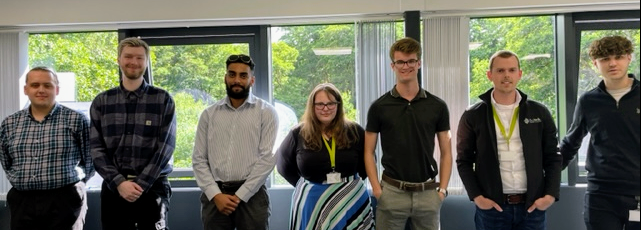Godalming College student, Jake, blogs about his week of work experience at Scitech.
From a very young age I have always been interested in how humans have helped people with medical illnesses or conditions to improve or extend their lives. In particular I am fascinated by how a seemingly small or insignificant thing such as capsule or tablet can help people live healthier and happier daily lives around the world. To me it encapsulates how human intelligence and endeavour has overcome challenges to make the world a better place. The science behind what happens in medicine is truly amazing! I am keen to study biomedical sciences at university and was extremely fortunate that Scitech agreed to offer
me one week’s work experience in July 2023.
Introduction to Scitech – a leading consultancy, engineering and construction company
I started my week with an office orientation and introduction to Scitech from my mentor Hazel. I was impressed to hear about the broad range of services and expertise Scitech offer to their customers ranging from mechanical engineering, architecture, process engineering to computer aided design and project management. In particular, I found the overview on building services very interesting because I had not considered how intrinsic planning makes sure the building is safe for use and also is needed before the project can even start. I was shown how the pressure gradients were controlled to ensure safety which I found interesting as I had learnt about pressure gradients in biology this year.
The monoclonal antibody manufacturing process
Hazel then introduced a research project they requested I work on during my week, for me to present back to a small group on Friday. It was exciting as not only was I being given a view of the type of work Scitech carry out, I was also being challenged to create something to deliver as though I was an employee of the company! I really appreciated being given this challenge so I could do my own research and think around a topic and be able to contribute back with some of my thoughts and ideas at the end of the week, rather than receiving information and trying to memorise them back as though I was at college. This is what I will need to do in a work environment so I thought it was a great idea and would help me to feel engaged and part of their team. In my case, I was asked to research on the monoclonal antibody (mAb) manufacturing process, which in a nutshell is an approach for creating a type of protein in a lab which can attach to cancer cells to diagnose and treat different cancers and other diseases.
Health and safety is everyone’s responsibility
On Tuesday I was given an overview of architecture from Matt, and health and safety from Brian, which was interesting as I learned that health and safety is essentially everyone’s responsibility in the office and we looked at some fascinating real life examples. I was also really impressed by the range of buildings implemented by Scitech.
Wednesday was when Nadira gave me an overview of building services where she explained how factors such as radioactivity and air circulation had to be considered. During most of the afternoon I carried on my research project and started to formulate my presentation structure as well as speaking to Ali about his take on the expanding world of biology.
On Thursday and Friday I worked fully on my project on my computer at my desk, making me feel as though I was an employee in an office conversing with colleagues. I spent the time creating a PowerPoint slide deck to deliver on Friday, and I tried to make sure I could create visually appealing slides with good content for the team to digest. In addition to this, Hazel gave an overview of many different types of laboratory equipment Scitech use, and then asked me to fill in the specifications of the equipment which was insightful.
On Friday, finally it was time to deliver my presentation to the group. I must say I was quite nervous, but I was able to get the main points across and answer the questions which were asked. I believe I was able to answer everything. When I told my parents about this they were amazed that in 1 week I was able to learn about Scitech and the pharmaceutical engineering industry, gain office experience and deliver a presentation in such a short time!
Highlights of the week
My three key highlights of the week were:
- The research I did for the manufacture of monoclonal antibodies
- Learning about process engineering
- The overview sessions of architecture and building services
I would like to thank Scitech for giving me such a fascinating insight into their operations and culture. In particular Emma Dawas, Joanna Finch, Hazel Hatley and all members of staff who were extremely helpful and friendly, making the week such an unforgettable and incredible experience.
- Read Adam’s work experience blog about how he gained an understanding of engineering and commercial management as he contemplates what career path to take.

